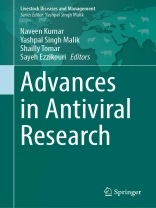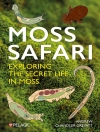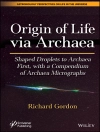This book illustrates advancements in the sophisticated tools and techniques for discovering and designing new antiviral drugs, identifying approved drugs against new and emerging viruses through large-scale computational virtual screening or drug repurposing approaches, and their evaluation in various in vitro and in vivo models. The chapters also cover the challenges associated with the emergence of antiviral drug resistance and possible ways to counter them. It discusses bioinformatics tools and software and computational approaches for the discovery of antivirals. The books also outline approaches for designing broad-spectrum antivirals effective against viruses by epigenetic- and epitranscriptomic-targeted reprogramming. Further, it provides vital details on the procedures for drug applications, clinical trials, and their regulations. Finally, the book provides a comprehensive yet representative description of advances in antiviral research protocols and methodologies suitablefor antiviral researchers at all career stages, including graduate and postgraduate students and policy-makers.
Table of Content
1. Antivirals: approaches and the way forward.- 2. Bioinformatics databases and tools available for the development of antiviral drugs.- 3. Developments in computer-aided drug design for antiviral research.- 4. Organoids in antiviral research: potential and challenges.- 5. Metabolomics tools in antiviral research.- 6. Epigenetic- and epitranscriptomic- targeted reprogramming: novel targets for the development of broad-spectrum antivirals.- 7. Application of cryoelectron microscopy in antiviral research.- 8. Host directed antiviral therapy.- 9. Role of herbal formulations in antiviral therapy – an overview.- 10. The use of animal models for antiviral therapeutics development: opportunities and challenges.- 11.
In-vitro and
in-vivo evaluation tools of SARS-Co V-2 antiviral drugs.- 12. Discovery of SARS-Co V-2 antiviral drugs through large-scale virtual screening of FDA-approved drugs.- 13. A high-throughput computational pipeline for selection of effective antibody therapeutics against viruses.- 14. Insights on various antiviral drugs for treating patients with COVID- 19.- 15. I
n ovo based antiviral assay for screening of herbal formulations against Influenza viruses.- 16. The path to cure Hepatitis B: How far are we?.- 17. Unveiling emerging avenues in antiviral research: navigating clinical trials and regulatory landscapes.
About the author
Dr. Naveen Kumar is a Scientist at the National Institute of High Security Animal Diseases, Bhopal, India. He is an evolutionary biologist specialized in virus evolution and with a background in synthetic biology, molecular, and clinical virology. His primary research interests focus on viral genomics, nanoparticles-based diagnostics, therapeutics, and vaccines for emerging and re-emerging zoonotic viruses, primarily Influenza and SARS-Co V-2 viruses. He also employs selective genetic and evolutionary tools to comprehend the dynamics of virus evolution. He has been conferred with many prestigious honours, including the Young Scientist Award from the Indian Virological Society, the SERB-International Travel Grant for attending ASV-2018 at the University of Maryland in the United States, and the International Federation of Biosafety’s Biorisk Management Certification. He had developed a number of diagnostic technologies, including one for which a patent has been granted onsynthetic-biology inspired diagnostics. He holds editorial positions in many international prestigious journals, such as Associate Editor of BMC Microbiology, Guest Associate Editor of Frontiers in Microbiology, Editorial Member of BMC Genomics and PLOS ONE, and Review Editor of Frontiers in Veterinary Science. He has served as a referee for a number of International journals, including Briefings in Bioinformatics (Oxford Academic), Scientific Reports (Nature), and Viruses (MDPI). He has also published more than 50 research articles in the peer-reviewed international journals and authored or co-authored numerous book chapters. He is a member of many national and international scientific societies and organizations importantly, American Society of Virology, Indian Virological Society, and Society of Biosafety, India.
Prof. Yashpal Singh Malik is currently the Dean of the College of Animal Biotechnology, Guru Angad Dev Veterinary and Animal Sciences University, Ludhiana, India. He is a recipient of the prestigious position “ICAR National Fellow” at the ICAR-Indian Veterinary Research Institute. His areas of expertise are rotaviral diseases, viral disease epidemiology, microbial biodiversity, host-virus interactions, and pathogen-diagnostics. He has pursued advanced studies in molecular virology at the University of Minnesota, USA; University of Ottawa, Ontario, Canada; and Wuhan Institute of Virology, Wuhan, China. He is the recipient of several prestigious national, state and academy awards and honors, including the ICAR-Jawaharlal Nehru Award. He has authored 8 books, 62 book chapters, and over 250 research and review articles. Dr Malik has been associated with societies of international repute, like, the Secretary General of the World Society for Virology (USA) and at national level serving as Secretary General of Indian Virological Society. Being a member in “One Health group in Federation of Asian Veterinary Association” (FAVA) for 2021-2025, he is the Indian flag bearer on the international forum. Dr. Malik is the Editor-in-Chief of the Journal of Immunology Immunopathology and has also edited special issues of the Springer journal Virus Disease, Bentham’s The Open Virology Journal, and the Journal of Current Drug Metabolism. He has been awarded a prestigious Fellowship by the Academy of Microbiological Sciences (AMSc), National Academy of Veterinary Sciences and National Academy of Dairy Sciences.
Dr. Shailly Tomar is currently serving as the Professor in the Department of Biosciences and Bioengineering at Indian Institute of Technology Roorkee, India. Dr. Tomar is the reviewer of various prestigious journals like; Journal of Virology, Antiviral research, Scientific reports, The Journal of Vector Borne Diseases, BMC, Biochemistry, BMC Structure biology, Current Chemical Biology, PLOS One, Acta Crystallographica Section D IUCR, and Journal of Biomolecular screening. She has been conferred with various prestigious awards notably, DST young scientist award (2006), Institute Research Fellowship for Outstanding Young Faculty (2018), Visiting Scientist in Karolinska Institute, Sweden Research Council (SRC) Grant (2019), Visiting Scientist, OVDF DST SERB in Purdue University, USA (2019). Her research group focuses on diseases caused by positive-sense ss RNA viruses including Chikungunya, Dengue, Influenza and SARS- Co V-2. Her laboratory is working towards discovery of antiviral therapeutics against infectious (+) ss RNA viruses and developing VLP based vaccines by employing structural biology, cell biology, molecular biology, biochemistry, computational biology, protein-protein interactions, and molecular biophysics techniques. The molecular virology lab of Prof. Tomar specializes in virus propagation, quantification, detection, antiviral assays and discovery of antiviral molecules. She has more than 15 years of teaching experience in Fundamentals of Biotechnology, Advance Virology, Geneticsand Molecular Biology, Biophysical techniques, Separation and Analysis of Biomolecules. Prof. Tomar has published more than 70 research articles in the peer-reviewed international journals and authored or co-authored several books and book chapters. She has organized various conferences and workshops mainly “Indo-US International Conference on Recent Advances in Structural Biology and drug discovery”, “Recent Advancements in Biophysical Techniques and Virology”, “48th National Seminar on Crystallography” at IIT Roorkee. She is a member of many international scientific societies and organizations importantly, Member of American Society for Virology (ASV), Member of American Society for Microbiology (ASM), Member of Indian crystallography society (ICA), Life Member of Indian Biophysical Society (IBS), and Life member of Indian Virology Society (IVS), India.
Dr. Sayeh Ezzikouri is a Research Director and Head of viral hepatitis laboratory, Pasteur Instituteof Morocco. He has earlier served as Researcher in the Virology Unit at Pasteur Institute of Morocco (2007-2016), Visiting Professor at Joint Faculty of Veterinary Medicine, Kagoshima University, Japan (2013-2015), and Visiting Scientist at Joint Faculty of Veterinary Medicine, Kagoshima University, Japan (2020). His research interests included but not limited to the public health, virus-host interactions, drug design, and HLA-based peptide vaccine design with specialization in viral hepatitis A, B, C, D, and E, non-primates hepacivirus, HIV, HPV, Zika virus, SARS-Co V-2, and liver cancer. He has served as referee for a number of International journals. He has more than 12 years of teaching experience in virology and molecular biology. He authored/co-authored of more than 100 research articles in the peer-reviewed international journals. Dr Ezzikouri is a member of the the Training and Career Development Committee of the World Society for Virology (USA). He is recipient of many national and international awards. He is a member of many international scientific societies and organizations.












